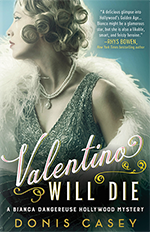My editor at Poisoned Pen Press had some cogent suggestions to make about Hornswoggled. I made a few changes and sent the amended copy of the MS back to her last week. She’s taken it with her on her Christmas trip, so I expect it will be after the holidays when I’ll hear if all is done to her satisfaction.
Now that the manuscript is out of my hands for a while, I’m working on two or three other writing projects that have been hanging fire. In fact, I have so many ideas that my head is about to explode. However, ideas are wonderful, but it’s the daily drudge at the word processor that gets the job done I find myself writing two sentences on one project before going off to wrap Christmas presents, then when I get back to the computer six hours later, I end up writing half a paragraph on a totally different story. This is not the way to accomplish literature.
What will actually happen, I’m sure, is that as soon as Hornswoggled is accepted, I’ll concentrate on setting up the publicity campaign for it, and at the same time try to finish the third book in the series. I’ll diddle with the other ideas off and on when I can.
It takes a lot of discipline to write, or at least to get anything finished. Like a lot of writers, I often wonder if I’ve really got enough of it, and if I’m ever going to finish anything again. When I do actually sit down and write, it’s usually quite a pleasant experience, especially if I don’t worry about what other people will think about the work. I think that’s where a certain amount of courage is required. Do I really want to say this? Do I want to bare my soul like this -what will you think of me, Dear Reader? Will you find me sappy and unsophisticated if I put this down? How about just plain horrible? Will you think I’m writing about a real person and thus dislike him or her? Will you think I’m writing about you, and thus dislike me for saying such revealing things about you?
In the Alafair Tucker series, I’m writing about a family that lived in Oklahoma in the early 20th Century. I’ve concentrated on the lovely family aspects of their lives, but I want to be as real as possible. All cannot be sweetness and light, after all. But I don’t want to write a social treatise, either. It’s a fiction, after all.
In my talks, I often say that the first thing a writer is taught is to ‘write what you know’. I think this is not as straightforward a sentence as it first appears. After all, if you’re a sci-fi writer, you’d be severely handicapped when describing the planet Koozbain if you interpret the tenet literally. I feel like ‘write what you know’ has to do with telling the truth about being a human being as you know it. If the writer tries her best to be authentic, she’s going to come up with something that is absolutely unique, because every human being is unique. I can tell you from experience, Dear Reader, that this is a very hard thing to do. It’s nigh on to impossible not to want to imitate the style of a writer you admire, or to tone down what you want to say because it might offend.
The business of writing is schitzophrenic, to say the least. You want to be published, you want to be read. You want to be liked. And yet, you want to – dare I say it? – create art. And the only way to do that, I sometimes fear, is to dig as deep as you can for your own truth. These days, if your truth is a certain kind of ugly, that’s often admired by the literati and disliked by the reading public. If your truth is sweet and hopeful, you stand in danger of being disdained by the literati, yet loved by readers.
My truth has a little of both. My fear is that if I tell it, I’ll be disdained by the literati AND disliked by readers. Just my luck… Well, so far, so good.



More Places to Go
Donis on Facebook
Type M for Murder